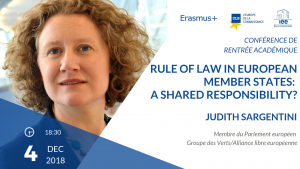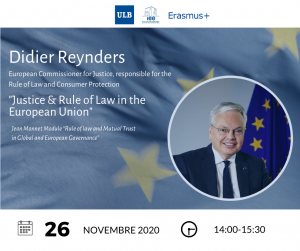Jean Monnet Module RoLETTE
Jean Monnet Module “Rule of law and Mutual Trust in Global and European Governance”
Academic coordinator: Ramona Coman
The Institute for European Studies of the Université libre de Bruxelles is coordinating since September 2018 a new Jean Monnet Module dealing with the rule of law and mutual trust in global and European studies. In recent years the salience of these concepts has considerably increased not only within the EU but also in other regions/regional organizations.
The aim of this project is to create a platform of academic and expert discussion that will shed light on current debates about the independence of the judiciary and the aim of specific judicial reforms in EU member states and beyond. The project brings together scholars and experts with academic backgrounds in different disciplines and plural views on the topic.

Event highlights 2018-2019
The first year of the RoLETTE project, focused on the “Rule of Law and Mutual Trust in Global and European Governance” a series of debates around the topic “Understanding EU’s debates on the rule of law and mutual trust” were proposed. See the detailed list of events of the 2018-2019 academic year.

Event highlights 2019-2020
The 2nd year of the RoLETTE project, 8 conferences & debates on the challenges to the rule of law and to mutual trust, combining both policy and academic approaches.
Please click here to see the full programme of events and poster.
Closing event
The discussion with EU Commissioner Didier Reynders, held online due to health restrictions, included topics such as the Rule of Law Report, conditionality in relation to the Rule of Law & fundamental rights in the context of COVID-19. It as moderated by Prof. Ramona Coman & Prof. Cecilia Rizcallah.
For an overview of the proyect’s events, please download the final brochure
Materials and module’s expected deliverables
- Course – Rule of law and mutual trust in global and European governance
This course (24) is open to all students registered in the Specialized Master in Interdisciplinary EU studies and the Master in European Studies; on demand it can be followed by any registered student at ULB or elsewhere
- Slides and readings for students available on the ULB’s Virtual University (UV) – for non-ULB members available on request.
- Description available here: https://www.ulb.be/fr/programme/tran-o610
- Course – The Challenges of the rule of law in the EU – in the Executive Master in European Union Studies (MEUS)
This course (18h) is designed for practitioners and professionals. It is opened to participants following the IEE’s MEUS program. It is open to practitioners and experts with an interest on the topic on demand and on the basis of selection.
- Materials will be available on the ULB’s Virtual University (UV)
- Webinar series on the Rule of Law in the EU: Challenges, Tools and Actors
- Policy briefs and opinions: cartes blanches
- Dr. Dragoș Călin is a judge at the Bucharest Court of Appeal, co-president of the Romanian Judges’ Forum Association, Director of the Judges’ Forum Review.
- Bogdan Pîrlog is a military chief-prosecutor in Bucharest, co-president of the Romanian Association Initiative for Justice.
Romania. How Judges and Prosecutors Fight for European Values
- Amélie Tagu (Student, Master in European Studies) in dialogue with Benedek Jávor
Interview: Benedek Jávor “Through the Hungarian case, we can understand the shortcomings in the EU”
- Maria Schinina, Official-Representative of the Italian Chamber of deputies to the European Parliament and participant in the IEE Executive Certificate in European Union Studies – MEUS
Rule of law as “integral part” of the next MFF: to what extent and why?
Strengthening the rule of law in the EU what role for the interparliamentary cooperation?
- Ilaria Moratello (student, Master in European Studies )
- Aliya Abenova (ULB alumna, 2019-2020)
The European Commission’s 2019 Initiatives on the Rule of Law
- Academic publications (textbook and peer-reviewed articles)
Coman, Ramona “Le clash des paradigmes? Quand l’Etat de droit se heure à l’essor des idées anti-libérales” dans Cahiers de droit européen, 2021, nr 1, pp.82-108.
Coman, R. (2019), “La défense de l’État de droit dans l’Union européenne: Un long processus de mise à l’agenda ou comment éviter l’activation de l’Article 7”, dans Bribosia, E. et al. L’Europe au Kaléidoscope. Liber Amicorum Marianne Dony, Éditions de l’Université, Bruxelles, 131-149.
Coman, R. (2020), “Configuring the Rule of Law in the EU polity: between Supranationality and Sovereignty” in M. Telo and A. Weyembergh (eds.), The Supranational at Stake? The EU’s external competences caught between complexity and fragmentation, Routledge, 2020.
About the project and its aims:
The proposed Jean Monnet module seeks to (1) consolidate interdisciplinary research on an emerging challenge facing the EU; (2) develop original teaching on timely topic in EU affairs; and (3) equip graduates and professionals with the necessary skills and contacts to integrate a specific professional environment.
- RoLETTE will focus on the “Rule of Law and Mutual Trust in Global and European Governance” and hinges on the creation of three new teachings, covering 132h of training, including:
A 24h/year graduate specialization course on “Rule of law and mutual trust in Global and European governance” open to MA students (eight 3h-lectures per year). - A 12h/year executive training course on the “Challenges of the rule of law and mutual trust in the EU” open to professionals, including those with a limited knowledge in EU studies (four 3h-lectures per year);
- A cycle of student-led conferences and public debates designed to expose students and professionals to expert debates surrounding the “Rule of law and mutual trust” (8h per year).
RoLETTE provides for an interdisciplinary and comparative understanding of the rule of law and mutual trust in a field of interest to students, practitioners and academics by diversifying: the training formats, the target audiences, and the range of activities.
Besides the development of three new teachings, RoLETTE will foster the necessary cooperation between leading academics and experts to allow for: (1) a set of academic articles in peer reviewed journals, (2) topical policy briefs, (3) an international textbook, as well as (4) new on-line teaching materials and teaching packs in open access. Overall, it will reach a wide Brussels-based audience of graduate students, professionals enrolled in training and experts. The 24h graduate course will be open to international students coming from Waseda University (Japan).

About the coordinator and the academics involved
 Ramona Coman, coordinator of the Jean Monnet Module, is an Associate professor in Political science at the Université libre de Bruxelles. She is the President of the Institute for European Studies. She studied political science at the University of Bucarest, she received her PhD from the Université libre de Bruxelles and conducted her post-doctoral research at the University of Bologna (IRSIG).
Ramona Coman, coordinator of the Jean Monnet Module, is an Associate professor in Political science at the Université libre de Bruxelles. She is the President of the Institute for European Studies. She studied political science at the University of Bucarest, she received her PhD from the Université libre de Bruxelles and conducted her post-doctoral research at the University of Bologna (IRSIG).
Her research and teaching focuses on European integration, Europeanization, EU modes of governance, rule of law, judicial reforms in Central and Eastern Europe, the role of experts and expertise in EU decision-making, the European Commission, think tanks, the role of values. She has an interest in the relationship between politics, law and society. Her work has been published in Journal of European Public Policy, Journal of European Integration, The British Journal of International Relations and Politics, Governement et Action Publique (GAP), Europe-Asia Studies etc.
 Anne Weyembergh is a Professor at the Université Libre de Bruxelles (ULB) and President emeritus of the Institute for European Studies of the ULB (since Sept. 2014). She graduated in Law (ULB, 1993 – 1st Class Honours) ; she holds a Master Degree in Public and Administrative Law (ULB, 1994 – 1st Class Honours) and a Master Degree in International Law (ULB, 1995 – 1st Class Honours). She has completed a PhD in Law at the ULB (2003 – Alice Seghers Price).
Anne Weyembergh is a Professor at the Université Libre de Bruxelles (ULB) and President emeritus of the Institute for European Studies of the ULB (since Sept. 2014). She graduated in Law (ULB, 1993 – 1st Class Honours) ; she holds a Master Degree in Public and Administrative Law (ULB, 1994 – 1st Class Honours) and a Master Degree in International Law (ULB, 1995 – 1st Class Honours). She has completed a PhD in Law at the ULB (2003 – Alice Seghers Price).
She founded and co-coordinates the European Criminal Law Academic Network (ECLAN) since November 2004. She is a Member of the Académie Royale des Sciences, des Lettres et des Beaux-Arts de Belgique (since 2017 – Classe des Lettres et des Sciences morales et politiques). She teaches European criminal law, international criminal law, Belgian penal law (special part), methodology of research in criminal law, the area of freedom, security and justice. Her main field of research is European criminal law. She has published numerous scientific articles and co-edited several collective books in the field of EU criminal law. The five last ones concern the blurring boundaries between administrative and criminal law, the future of approximation of substantive criminal law, EU counter-terrorism offences, the future of mutual recognition and the role of the European Court of Justice in criminal matters.


 “The European Commission support for the production of this publication does not constitute an endorsement of the contents which reflects the views only of the authors, and the Commission cannot be held responsible for any use which may be made of the information contained therein.”
“The European Commission support for the production of this publication does not constitute an endorsement of the contents which reflects the views only of the authors, and the Commission cannot be held responsible for any use which may be made of the information contained therein.”